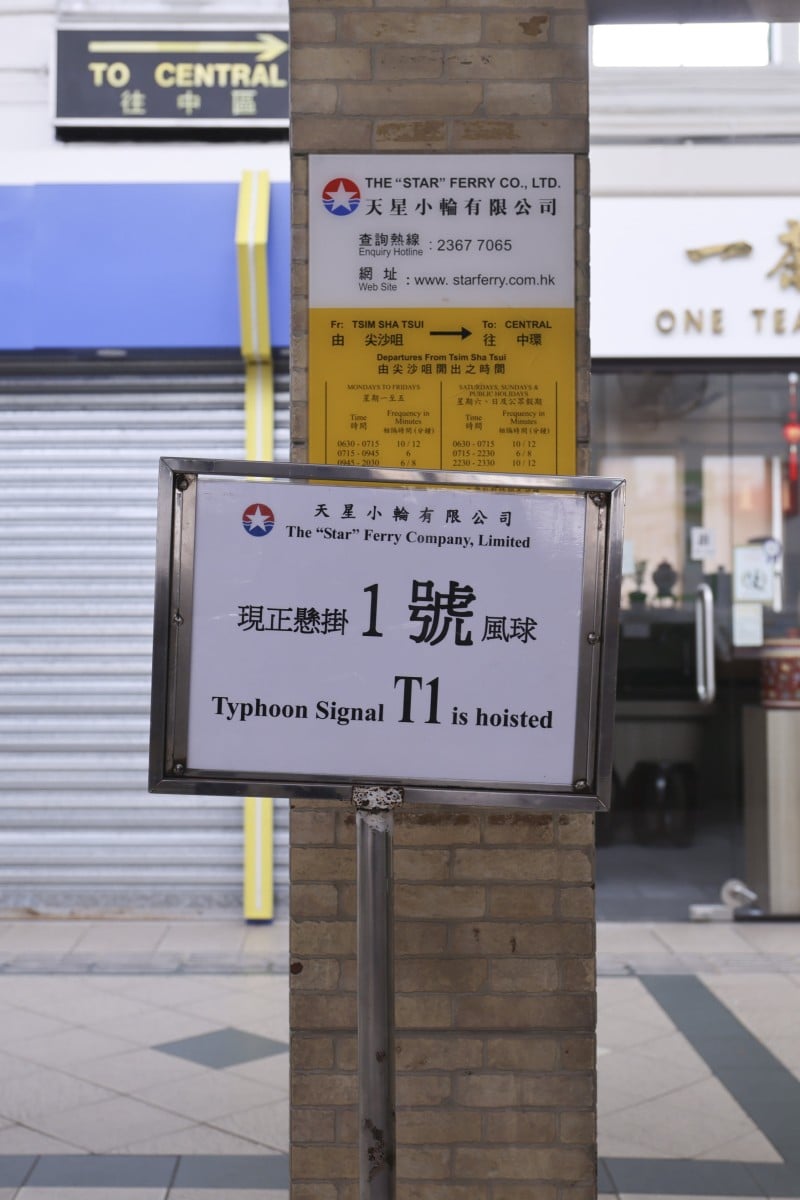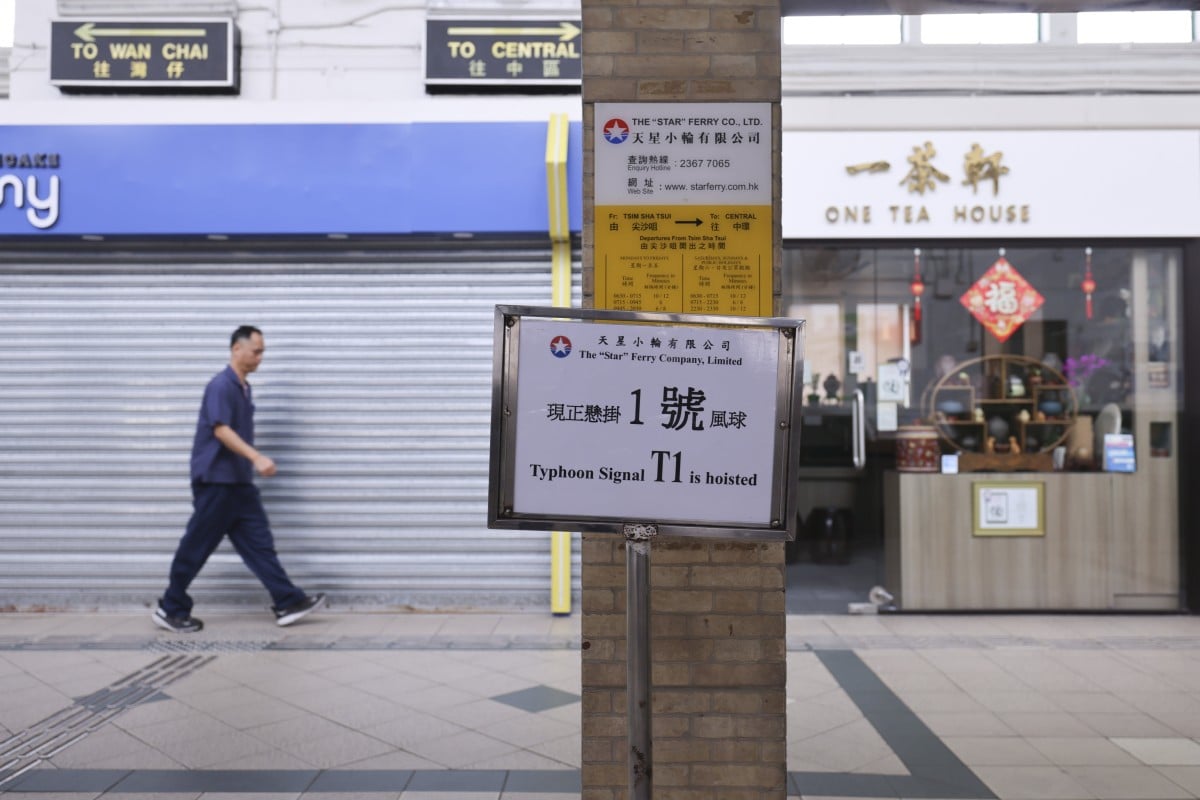
Face Off: Should private businesses be required to close during a typhoon?
Each week, two readers discuss a hot topic in a parliamentary-style debate that doesn’t necessarily reflect their personal viewpoints.
 Tourists roam the Tsim Sha Tsui promenade under the No 1 typhoon signal, which remained in force as Tropical Storm Man-yi weakened in November 2024. Photo: Nora Tam
Tourists roam the Tsim Sha Tsui promenade under the No 1 typhoon signal, which remained in force as Tropical Storm Man-yi weakened in November 2024. Photo: Nora TamIf you are interested in joining future Face Off debates, fill out this form to submit your application.
For: Angelina Au-yeung, 15, ELCHK Lutheran Academy
Given the frequency of typhoons ravaging Hong Kong each season, especially from May to November, are we willing to put employees at risk during dangerous storms just to protect a business?
Hong Kong citizens’ well-being should be our utmost priority. Thus, private businesses should be required to close during a typhoon.
Staying open would not increase profits. The reality is that people are supposed to stay home. Given the hazardous conditions – including strong winds, flooding and potential infrastructure damage – all companies have a personal and social responsibility to keep their customers and employees safe.
One to two days of profit does not justify encouraging citizens – who may feel compelled to stock up – to risk danger venturing out.
As typhoon warnings are issued one to three days in advance, businesses should heed predictions and prepare accordingly. This means orderly shutdowns and avoiding last-minute confusion.
Should Hong Kong loosen the ban on surfing?
For example, Super Typhoon Mangkhut in 2018 caused US$593 million (HK$4.6 billion) in damages across Hong Kong, exemplifying the extensive property risks.
Scheduling unnecessary operations and choosing to be in the line of harm would be an outrage. Businesses have a responsibility to secure their workplaces to mitigate any risks during violent weather.
Essential services – including hospitals and healthcare, law enforcement and firefighting and utilities such as electricity and water supply – continue to operate during typhoons.
Private businesses should do everything possible to reduce strain on these services and the emergency response systems. It does not matter if the typhoon is presumably weak; if private sector workers are still going to their place of employment, it increases the chance of accidents or injuries.
Private companies and businesses should focus on safety and protecting life instead of being delayed by additional incidents that could have been avoided through mandated closures.
Inevitably, typhoons will continue lashing Hong Kong every season. However, we can prevent unnecessary accidents and a greater toll on our people and the economy through coordinated defensive actions, including the required temporary closing of private businesses.
Against: Heer Donda, 14, King George V School
Hong Kong faces at least five to six tropical cyclones yearly that significantly affect the entire city, from restaurants and malls to schools and workplaces.
It is necessary, of course, to have safety regulations in place. However, that does not need to mean all workplaces, especially private ones, should stop running.
Hong Kong is one of the top 50 largest economies in the world. As of November 2024, the city is home to 131,777 local companies, of which 130,689 are private.
If 99.2 per cent of businesses in Hong Kong shut down for a day, it could significantly affect finances and the economy, especially for companies competing with international businesses not subject to similar laws.
The potential threat is highly dependent on a typhoon’s severity. If a No 8 typhoon signal has been issued and employees are travelling to or from work, employers are liable to pay compensation for injuries. The warnings of a lower signal, such as No 3, are relatively minor and would not require as many restrictions.
The government already has restrictions regarding work that correspond to a typhoon’s severity; therefore, there is no need to implement mandatory closures.
More pertinent private businesses, such as pharmacies and grocery stores, should not be required to close, especially during critical times like a longer storm. For example, if a person needs a particular medication, there should be a safe but accessible way for a pharmacy to supply it.
Should Hong Kong schools continue virtual lessons during weather-related school closures?
According to the Hong Kong Observatory, a low-pressure storm centre and prevailing winds usually produce more severe conditions in the west than in the east. If typhoons are not as severe in certain areas, workers there should be given the ability to make decisions regarding their safety by themselves.
Essentially, businesses should work with employees to judge whether workers can complete their intended job while remaining safe. Private businesses should be free to decide whether to stay open or shut in a typhoon.
Hong Kong is undoubtedly known for its severe typhoons. The government has already set the necessary regulations for more drastic circumstances; there is no need for a single closing measure for all private businesses during every type of typhoon.
